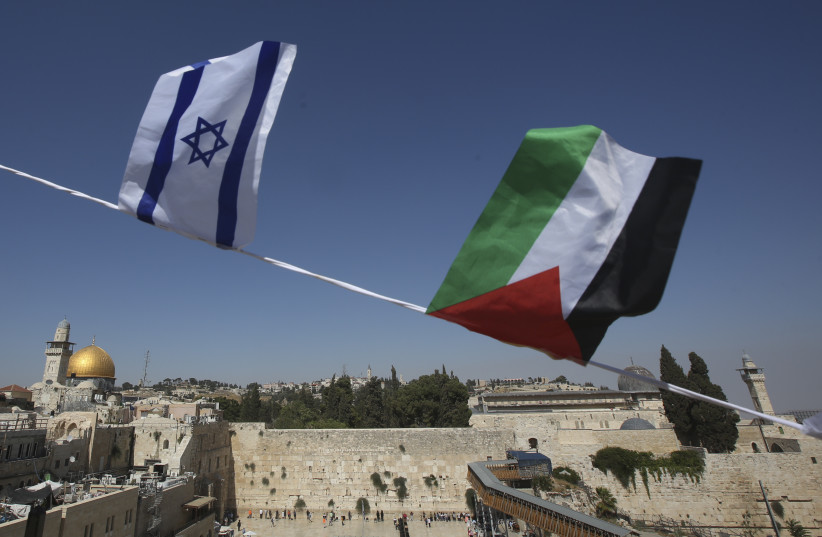European calls for Palestinian statehood isn't principled diplomacy, it's panic - opinion
These nations understand that Israel’s methodical approach to victory in Gaza is dismantling the carefully constructed mythology surrounding Palestinian statehood.

Last month, Danish Prime Minister Mette Frederiksen declared that “this is the right time to recognize a Palestinian state.”
She was joined by Finland’s leadership, accompanying a cascade of similar announcements from Canada, the United Kingdom, France, Australia, Norway, Jordan, Malta, and Colombia, which announced the appointment of their first ambassador to the State of Palestine.
The United Nations has scheduled a conference for June to discuss Palestinian statehood.
All this begs the question: Why now?
First, let’s consider what these nations are actually proposing. Who exactly would govern this Palestinian state they’re so eager to recognize? According to all these statements, it would be the Palestinian Authority under Mahmoud Abbas, a man elected in 2005 to a four-year term.

According to the polling this month from the Palestinian Center for Policy and Survey Research (PCPSR), 81% of Palestinians demand Abbas’s resignation. A September 2024 poll showed that only 6% would vote for him if elections were held.
This raises questions about what kind of “state” these governments are advocating. Would it be democratic? If so, Hamas would control it. Would it have its own military? Would it control its borders? Would it be at peace with Israel?
The PA continues paying hundreds of millions of dollars annually to families of terrorist murderers – a practice they’ve maintained since their inception. Their education system preaches hatred of Jews and Israel.
According to the most recent PCPSR poll, 59% of Arabs in Judea and Samaria still approve of Hamas’s attacks on October 7, 2023.
Such a “state” could hardly have its own military or control its borders without posing an existential threat to Israel. What these nations are proposing isn’t really statehood at all – it’s the formalization of a terrorist haven.
The timing of this international panic reveals the true motivation. Israel has begun distributing humanitarian aid directly to Gaza’s population, bypassing Hamas entirely. This is causing seismic shifts in Gaza’s power structure.
When civilians receive aid directly from Israel rather than through Hamas, they begin evacuating from Hamas-controlled areas. Hamas has desperately called on people not to evacuate and warned of consequences for those who do.
As Israel continues this strategy, with an eye toward helping those who want to leave Gaza actually depart, the entire two-state solution narrative begins crumbling. Polling consistently shows that a significant portion of Gazans want to leave if given the opportunity.
A March Gallup poll reported that 52% of Gazans would leave if possible. The Washington Institute for Near East Policy puts the number at 60%. Even Palestinian (PCPSR) polling shows 43% want to leave.
Claims about “forced displacement” are fabricated. What Israel advocates – and what US President Donald Trump discussed – is voluntary emigration for those who choose it. The right to leave a war zone is a fundamental human right enshrined in the Geneva Conventions, yet it’s been denied to Gazans throughout this conflict by their supposed advocates.
As people begin leaving voluntarily and Hamas continues losing control – deprived of humanitarian aid, cash, weapons, and leadership – their governing structure is collapsing. The prospect of potentially over a million Gazans choosing to leave, combined with Hamas’s destruction, means the fiction of Palestinian statehood built on this territory is evaporating.
This is why nations hostile to Israel are panicking. They recognize that Israel’s victory threatens the entire Palestinian narrative they’ve carefully constructed over decades. Their desperate push for immediate statehood recognition represents a last-ditch effort to preserve this fiction before reality renders it impossible.
There’s another crucial element these nations are ignoring: legal precedent.
Every agreement negotiated between Israelis and Palestinians since the 1993 Oslo Accords – that famous White House lawn handshake that initiated the peace process – stipulates that Palestinian statehood is a matter for bilateral negotiation. Declaring or recognizing a Palestinian state without Israeli consent violates all existing agreements.
Ironically, this violation may benefit Israel by freeing it from constraints imposed by these now-abrogated agreements, making it easier for Israel to secure its future without being bound by previous diplomatic commitments.
Calls for Palestinian statehood are acknowledgement that Israel is winning
What we’re witnessing isn’t principled diplomacy – it’s panic. These nations understand that Israel’s methodical approach to victory in Gaza is dismantling the carefully constructed mythology surrounding Palestinian statehood.Their frantic calls for immediate recognition represent desperate attempts to salvage a narrative that reality is destroying.
As this pressure campaign intensifies in the coming days and weeks, remember what it truly represents: acknowledgment that Israel is winning. The louder these calls become, the clearer it becomes that those making them recognize their preferred outcome – Israel’s defeat – is slipping away.
The world’s panic over Palestinian statehood isn’t about justice or human rights. It’s about preventing Israel from achieving the victory that would finally bring genuine peace to the region.
The writer is the executive director of Israel365action.com and host of the Shoulder to Shoulder podcast.






